The Electronics and Telecommunication Department of Modern Education Society's College of Engineering was established in 1999 with an intake of 60 students. The intake of students increased to 120 in 2011. The department has also started offering the Post-Graduation (PG) course M.E in Signal Processing since 2013.
The department is Accredited by the National Board of Accreditation (NBA) and the National Assessment and Accreditation Council (NAAC) an autonomous body funded by the University Grants Commission of Government of India with an 'A' grade. The department has a well-qualified and experienced faculty with 7 doctorate professors and 10 pursuing their PhD degrees. Faculty members of the department are not only engaged in cutting-edge technology research but are also very passionate about teaching. The faculty of the department is encouraged to upgrade their knowledge by encouraging students to attend courses, workshops and seminars and project competitions at state and national levels.
The department has a Center of Excellence in the field of Software Defined Radio in collaboration with Amitec India Pvt. Ltd. The institute has NI LabVIEW which consists of all sorts of sensors and a data acquisition module in collaboration with National Instruments. To make students ready for industry requirements the department has started offering 3 Honors programs from AY 2020-21 related to Artificial Intelligence and Machine Learning, Data Science and Internet of Things. Also, it has a Research and Development lab, where staff and students complete their research projects. The students do projects in collaboration with renowned industries like NCL, Bharat Electronics Ltd., Kirloskar Pneumatics Co Ltd, Silverline Electrical Pvt. Ltd., and Geometric Pvt. Ltd, etc.
Department offers sponsorship for BE in-house projects. The students of the department have been selected for post-graduation courses at various foreign universities. We are proud to declare that a few of our students have cleared the Civil Services Examination and are excelling in their careers. The students are encouraged to participate in co-curricular activities like ROBOCON- National level Competition, National level conference and ETSA activities. The students actively participate in NSS activities. The department also conducts workshops, guest lectures, and Industrial visits to enhance the technical knowledge of students.
To groom Motivated, Environment friendly, Self-esteemed, Creative and Oriented Electronics &Telecommunication Engineers.
To develop Industry Oriented Manpower to accept the challenges of Globalization by,
The following Program Educational Objectives are established for the Electronics & Telecommunication Engineering:
The graduates of Electronics & Telecommunication Engineering will have,
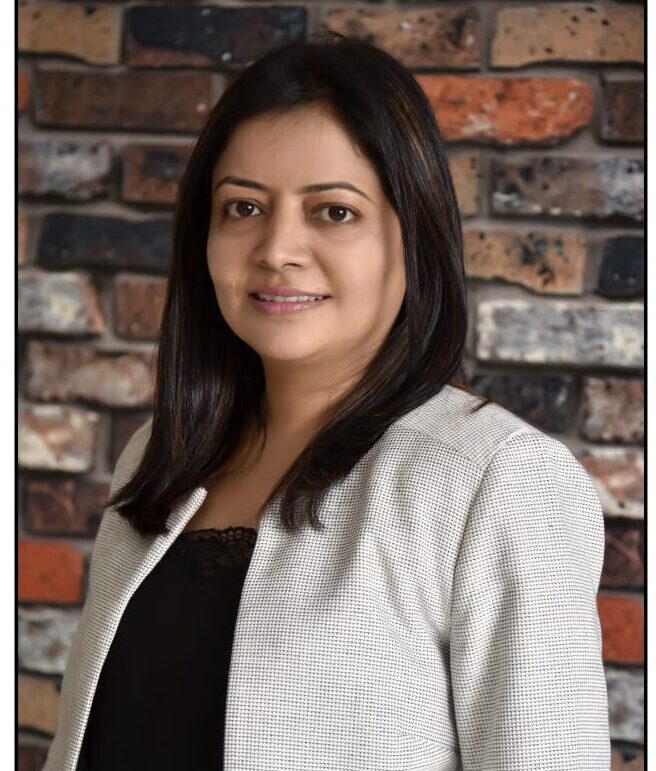
Welcome to the Department of Electronics and Telecommunication Engineering at M.E.S. Wadia College of Engineering.
Our department is committed to academic excellence, research innovation, and industry-oriented learning, preparing students to thrive in a world driven by cutting-edge technologies. With a team of highly qualified and experienced faculty and state-of-the-art laboratories, we ensure that students acquire strong theoretical foundations along with hands-on practical skills.
Our industry-aligned curriculum fosters critical thinking, problem-solving abilities, and technical expertise, equipping students to meet the ever-evolving demands of the electronics and telecommunication sector.
We take pride in our Centers of Excellence, which provide students with access to industry-relevant tools and technologies:
These collaborations empower students with resources to undertake innovative projects, research, and product development. MoUs and Industry Collaborations To strengthen academic–industry partnerships, the department has signed Memorandums of Understanding (MoUs) with the following esteemed organizations:
| Sr. No. | Staff Name | Designation |
|---|---|---|
| 1. | Mr. L. N. Malagi | Lab Assistant |
| 2. | Mr. S.A.Dhebe | Lab Assistant |
| 3. | Sakahari Kasbe | Peon |
| 4. | Mr. D. D. Ughade | Peon |
| 1. | Basic Electronics Lab | 8. | Digital and Analog Communication Lab. | |||
| 2. | Electronics Measurement and Advanced Equipment Lab | 9. | Microwave and Optical Communication Lab | |||
| 3. | Project and Design Development Lab | 10. | Mechatronics Lab | |||
| 4. | Digital Electronics Lab. | 11. | Embedded Lab | |||
| 5. | Circuit Simulation And Modeling Lab | 12. | PG Lab | |||
| 6. | Signal Processing Lab | 13. | Centre of Excellance- amitec Lab | |||
| 7. | VLSI Design and Software Development Lab | 14. | DBM Lab |
In the Basic Electronics Engineering Lab, the first-year students are trained to handle the basic equipment/instruments including Signal Generators, Cathode Ray Oscilloscope (CRO) and Digital Multimeter (DMM).
Fundamental experiments in Analog and Digital Electronics are offered. The basic purpose is to understand the importance of learning by doing, the impact of electronics in the modern world, and the need to understand the basic principles of electronics.
This lab covers experiments on basic electronics components and their features, Integrated Circuit Operational Amplifier circuits and Digital Integrated Circuits.
Major Equipment: CRO, Signal Generator, Single Power Supply, Dual Power Supply, Digital IC Trainer Kits, Basic Electronics Experiment Kits.
Utilization of Laboratory: Sem-I- F.E. Basic Electronics Engg Sem-II- F.E. Basic Electronics Engg.
Lab In charge: Prof. S.S.Pansare Support Staff: Mr. L.N.Malage
The lab aims at imparting practical knowledge of Power Electronics and different measuring instruments to the students. It has all the necessary and in-demand equipment and trainer kits to teach practicals from fundamentals to high-level concepts to the students. Learn the characteristics of different types of power electronic devices, understand and analyze the operation of controlled rectifiers, choppers & inverters. Students are trained to handle measurement instruments including Spectrum analyzer, UPS, Logic Analyzer, and Digital storage oscilloscope.
Hardware: CRO, Signal generator, Dual power supply, Offline UPS trainer kit, DSO, Power Scope, Controlled rectifier, AC voltage controller, Triggering Ckt., Inverter, Chopper, SMPS, Logic analyzer, True RMS meter, Spectrum analyzer, Distortion meter, Frequency Counter.
Utilization of Laboratory: Sem-II- T.E. Power Electronics Engg.
Lab In charge: Prof. U.D.Dattasamje
The lab is equipped to assist students with designing, constructing, testing and experimenting with analog circuits. The lab emphasis is to provide students with analog design experience. In addition, the lab supports those who do their mini projects, signal conditioning circuits for BE projects or ME thesis related to analog circuit designs.
Major Equipment:
Cathode Ray Oscilloscope 30 MHz Cathode Ray Oscilloscope 20MHz Function generators 2 MHz Dual power supply +/-30V,2A Power supply +5, +/-30V,2A Digital storage oscilloscope 25 MHz
Support staff: Mr.S.B.Shinde. Lab area:64sqm.
The laboratory is well equipped with digital trainer boards and an IC tester required to give hands-on training to students in digital Electronics subject.
The Laboratory conducts practical sessions for students to enable them to implement their theoretical knowledge, observe the practical results, gain practical knowledge and understand the subject to implement it in industry.
Major equipment: Digital IC Tester Mechatronics Test Equipment (I) Pvt Ltd. 01 Digital Trainer Boards Tirupati Entp. 15 Hal Tec Plus 15 Laser Printer 1020 Plus HP 01 Computers Lenovo 07 DC Power Supply and CRO Hal Tec Plus 04 Function Generator Tirupati Entp. 04
Lab In charge: Dr. Kadam Rekha Shashikant
The laboratory is well equipped with high-end computer systems & software. The licensed Software installed in the laboratory includes Multisim 14, 12, and Multisim 11. During the first semester, the laboratory is used to conduct lab work for S.E. E&TC Engineering students for the assignments in Electronic Circuits and mini-projects.
As a part of the Electronic Circuits laboratory, students perform simulation assignments to test different circuits based on transistors. This includes circuits like feedback amplifiers oscillators etc. As a part of Design, they simulate their designs like SMPS, Power supply to finalize design assignments. During the Second semester, the laboratory is used to conduct lab work for S. E. E&TC Engineering students for the assignments in languages like C, C++ and Java
Major Equipment: Software Installed: Multisim 14, 12, Multisim 11 Printers: 2 Laser Printers
Lab In-charge: Prof. S.N.Dharwadkar
The lab space is 66sqm occupied by 1 staff cabin and 25 Desktops. The licensed software installed in the laboratory includes MATLAB R2021a & Campus-Wide Suite. Experiments based on software are performed in this lab. This lab covers experiments on Signal Processing, Image Processing, Digital Communication, and Machine Learning.
Major Equipment: Hardware: 25 computers Lenovo Z500 corei7,8GB RAM, 1 TB HDD,19” TFT Monitor. Printers: LaserPrinter-1 Switch: Huawei Gigabit Switch 24 Port.
Software Installed: Suse Linux, Win10 Professional, MATLAB, Microsoft Office, C/C++
Utilization of Laboratory: During the first semester, the laboratory is used to conduct digital signal processing for T.E.(E&TC), Digital image processing lab for E.T.E.(E&TC), and LABforME (signal processing). During the second semester, the laboratory is used for the conduction of Information theory and coding technique lab for T.E. (E&TC), Speech processing for B.E. (E&TC), and LABforME (signal processing)
Lab In-charge: Prof. M.M. Dhanvijay Support staff : Mr. Sanjay Dhebe
The VLSI laboratory is well equipped with the most up-to-date industry standard VLSI EDA tools and hardware resources like Xilinx Vivado Suite and tools, Spartan3 FPGA,Virtex5 FPGA, SPARTAN 6 FPGA, ARTIX 7 FPGA and CPLD. The laboratory provides hands-on experience to students in the field of analog and digital circuit design to conduct world class research. The laboratory is designed to expose the students to a set of tools for CMOS design, starting with SPICE circuit simulation and leading to physical layout, design rule checking, and extracted circuit simulation. Students gain knowledge in using EDA tools to design, simulate, and verify schematics and layout of logic gates. It also serves to facilitate design and implementation of digital design on FPGA. The students use Programming Languages like VHDL etc. to do their course work and project work. The VLSI laboratory is well equipped with 25 high end PCs with various licensed software and 10 Basys SPARTAN 6 FPGA Boards for students.
Utilization of Laboratory: The lab is used for course VLSI Design and Technology Practical in BE Sem-I and for BE Projects. Students also use this lab for doing mini projects.
Name of Lab In-charge: Dr. Kanchan S. Tiwari
The laboratory is well equipped with digital and analog communication trainer kits, spectrum analyser, CRO, DSO, function generator required to give hands-on training to students for digital communication and principles of communication system course.
The Laboratory conducts practical sessions to students to enable the students to implement their theoretical knowledge, observe the practical results, gain practical knowledge and understand the course to implement it in industry .
The Laboratory conducts sessions for S.E.to B.E. students .
Lab Incharge: Prof. Bharati Mohan Narute
The laboratory is well equipped with equipment and instruments required to give hands-on training to students for advanced subjects like Optical communication, and Mobile communication.
The Laboratory conducts practical sessions and training for students to lead them to implement their theoretical knowledge and observe the practical results and gain practical knowledge to implement it in the industry.
Major Equipment: The laboratory has a Microwave bench for X-BAND including Microwave transmitters using Klystron Tube and Gunn diode. The Microwave bench has been purchased from AMITEC Electronics LTD. The Optical Fiber Communication Lab has been set up including Optical Transmitters, Optical Receivers, Optical fiber both plastic and glass, optical patch cords, optical pigtails, connectors, adaptors and attenuators. The Optical communication Lab has measurement instruments such as Optical Power Meter and Optical Time Domain Reflectometer purchased from Bench Mark Electronics Ltd. The Optical Power Meter manufactured by SVAN Teletronics in the 2nd and 3rd window of operation is available in Lab. Optical sources such as L.E.D and Laser Diodes and Optical Detectors such as P-i-N diodes and APD are available in Lab. The Lab has an inbuilt precision measuring tool- A mechanical jig for measuring the Numerical Aperture of fiber with a precision of 0.01mm The optical sources and detectors used are from INFINEON The lab has a 5.8 GHz Satellite trainer kit by AMITEC Electronics LTD.
Microwave Bench X-band AMITEC Electronics LTD, 1 Optical Fiber Analog Link Photon Techniques, 3 Optical Fiber Digital Link Photon Techniques, 2 Optical Trainer for LD 1310 nm Photon Techniques, 1 Optical Tx and Rx Photon Techniques, 1 Optical Analog & Digital trainer FALCON, 3 Optical Analog Link Trainer Sigma Trainers, 1 Optical Digital Trainers Sigma Trainers, 1 Frequency Response - Optical Sigma Trainers, 1 OTDR Benchmark Electronics, 1 Optical Power Meter SVAN Electronics, 1 Antenna Trainer Lab AMITEC Electronics Ltd, 1 Microstrip Antenna Lab AMITEC Electronics Ltd, 1 C.R.O Systronics Ltd, 5 Regulated Power Supply Radial Industries, 5 Optical Power Supply Photon Technique, and 5 Function Generators APLAB 2.
Lab In charge: Prof. Y.M.Ajgar
Support Staff: Mr. S.M.Kate
In the Mechatronics Lab, the third-year students are trained to handle various sensors & actuators. Experiments performed in the mechatronics lab majorly involve the interaction of various sensors, transducers and actuators with an Arduino board which is representing the modules designed in National Instrument’s LabView software. Few trainer kits are there for the understanding of different sensors. These trainer kits & interfacing platforms always help students to understand the basic knowledge of measuring, controlling & calibrating various sensors involved in lab experiments.
Major Equipment: CRO, Signal Generator, Single Power Supply, Dual Power Supply, Dual Channel CRO, 6 Power Supply (0-32VDC), 8 Analog PLC trainer kit, 1 LVDT transducer distance measurement kit, 1 Arduino uno boards and 8 Lenovo PCs.
Lab In charge: Prof. P. S. Tondewad
Support Staff: Mr. Sunil Kate
In the Embedded Systems Lab, the third year and final year students are trained to perform experiments using advanced microcontroller development boards. Students learn detailed architectures of advanced controllers and write programs for the same. In Embedded Systems Lab, we facilitate students to develop their mini projects in third year and major projects in final year.
Here, we also train students for Embedded operating systems on ARM9 development boards. Also students write program for DSP processor such as TMS320C67 processor. In this lab students are facilitate with Arduino Uno boards to their prototype along with the various sensors.
Major Equipments: ARM7 – LPC2148 Development Board, ARM9 – LPC2129 Development boards, CortexM3- LPC1768 Development boards, Texas Instruments DSP – TMS320C67 Development Boards, Interfacing cards – Graphic LCD, TFT display, GSM/GPS, SD Memory cards etc
Utilization of Laboratory: Sem-I- BE – Elective 1 – Embedded Systems & RTOS Sem-II- TE – Advanced Processors
Lab Incharge: Prof. P. M. Bagul Support Staff: Mr. Sanjay Dhebe
Centre Of Excellence in Telecomm was established in the year 2015 and formally inaugurated on 8 TH June 2015 jointly by B.O.S Chairman of Electronics & Telecomm Dr. D.S.Bormane of SPPU and Mr. Amit Sharma –CEO of AMITEC Electronics Pvt. Ltd, New Delhi
The Centre of Excellence in Telecomm is established under the Industry Institute Interaction Cell to reduce the gap between industry expectations and academic offerings by direct involvement of industry to attain a symbiosis. Transfer of Skills and knowledge from industry will promote the activity “Bridging the gap between INDUSTRY –ACADEMIA “
The first collaboration Of COE-TELECOMM was with Amitec Electronics Pvt. Ltd, New Delhi which has signed an MoU with our college to help set up a laboratory in COE-TELECOMM. Amitec Electronics –New Delhi has set up a Lab in Software Defined Radio – a new technology relating to XG and Cognitive radio. Academics, Hands-on Training in SDR, Projects and Research are some of the aims of COE- TELECOMM. Besides SDR, the COE-TELECOMM is equipped with a Measurement /Fabrication Lab, EMI- EMC LAB for testing along with a Logic /Protocol Bus Analyzer. Amitec Electronics Pvt. Ltd as per the MoU has helped the COE –TELECOMM with industry-based projects and industrial visits to their factory workshop in Sahibabad. Faculty Development Programmes and Short-Term Training programs are continually held by the COE-TELECOMM.
RemoteLabs.in has been established under the COE-TELECOMM by a FACULTY from the college R&D cell and an undergraduate student from an external college. Using the facility of RemoteLabs.in, students from any location nationwide can connect to our Software Defined Radio Lab and perform and test practicals live!
Check the demo video on https://lnkd.in/b5WCXgd to see many more projects and research ongoing at COE-TELECOMM.
The laboratory is well-equipped with high-end computer systems. The licensed software installed in the laboratory includes Windows and MATLAB. The laboratory is used to conduct lab work for S.E and T. E. E&TC Engineering students for the assignments in Signals & Systems and Control Systems using MATLAB and Database Management practicals where students implement and study assignments related to different applications.
Major Equipment: Hardware:20 computers with configuration as Lenevo ThinkCentre desktop, Intel Core i5-12Gen, 256GB SSD, 1GB HDD,56GB SSD,19.5 Monitor Switch: 1 Network Switch 24 Port Network Manager Cisco CBS350-24P-4G
Projector: EPSON EB X-49 Software Installed: MATLAB Name of Lab In-charge: Prof.S.S.Pansare Support Staff: Mr. L.N.Malagi

| Sr. No. | Year | Name of Student | Percentage (%) / CGPA |
|---|---|---|---|
| 1 | 2004 | Suraj Naik | 70.00 % |
| 2 | 2005 | Dinesh Iyyengar | 77.20 % |
| 3 | 2006 | Arpit Jain | 73.93 % |
| 4 | 2007 | Andrea Pereira University topper | 78.53 % |
| 5 | 2008 | Siddharth Shah | 76.06 % |
| 6 | 2009 | Varun Mehta | 76.00 % |
| 7 | 2010 | Madhura Tapse | 78.06% |
| 8 | 2011 | Amar Khopade | 71.53 % |
| 9 | 2012 | Varun Nair | 74.53% |
| 10 | 2013 | Vallabh Jagtap | 77.86 % |
| 11 | 2014 | Pratik Pandey | 71.86 % |
| 12 | 2015 | Rohit Shinde | 73.19% |
| 13 | 2016 | Samveg Shah | 78.00 % |
| 14 | 2017 | Sayali Mahajan | 83.73 % |
| 15 | 2018 | Tejaswini Warekar | 78.00 % |
| 16 | 2019 | Purva Ardhapurkar | 80.16 % |
| 17 | 2020 | Manisha Chemate | 76.29 % |
| 18 | 2021 | Burhade Aparna | 10 CGPA |
| 19 | 2022 | Sanskarti Patankar | 09.39 CGPA |
| 20 | 2023 | Anjali Suryakant Jadhav | 09.29 CGPA |
| 21 | 2024 | Swapnil Dhondiram Akhade | 09.14 CGPA |
04-09-2023 to 03-09-25
14-06-2024 to 13-06-2030
14-11-2024 To 13-11-2027
20-02-2025 to 19-02-2027
The purpose of this MOU is to establish a mutually beneficial collaboration between CounselNavi and the Institution to enhance career guidance and support for students while fostering awareness about CounselNavi's platform and services.
The main purpose of this MOU is to develop academic and educational collaboration and to promote mutual understanding between Modern Education Society's Wadia College of Engineering, Pune & ICFAI BUSINESS SCHOOL (IBS) in mutually beneficial areas.
20-05-2021 To 19-05-2022
Highlights
10-12-2020 To 09-12-2021
Highlights
30-12-2020 To 29-12-2021
Highlights
Collaboration Period : From 07-02-2019 To 11-12-2025
Highlights-
Collaboration Period :01-08-2018 To 01-08-2019
Highlights-
Collaboration Period : From 10-06-2015 To 10-06-2016
Highlights-
Collaboration Period : From 30-11-2015 To 30-11-2018
Highlights-
Collaboration Period : From 15-09-2015 To 15-09-2017
Highlights-
Collaboration Period : From 10-05-2015 To 10-05-2020
Highlights-
Collaboration Period : From 11-03-2015 To 11-03-2016
Highlights-
Collaboration Period : From 06-08-2014 To 05-08-2017
Highlights-
Collaboration Period : From 14-08-2015 To 14-08-2016
Highlights-
Collaboration Period : From 25-05-2014
Highlights-
Collaboration Period : From 11-03-2014 To 17-03-2017
Highlights-
Collaboration Period : From 24-06-2013 To 24-06-2014
Highlights-
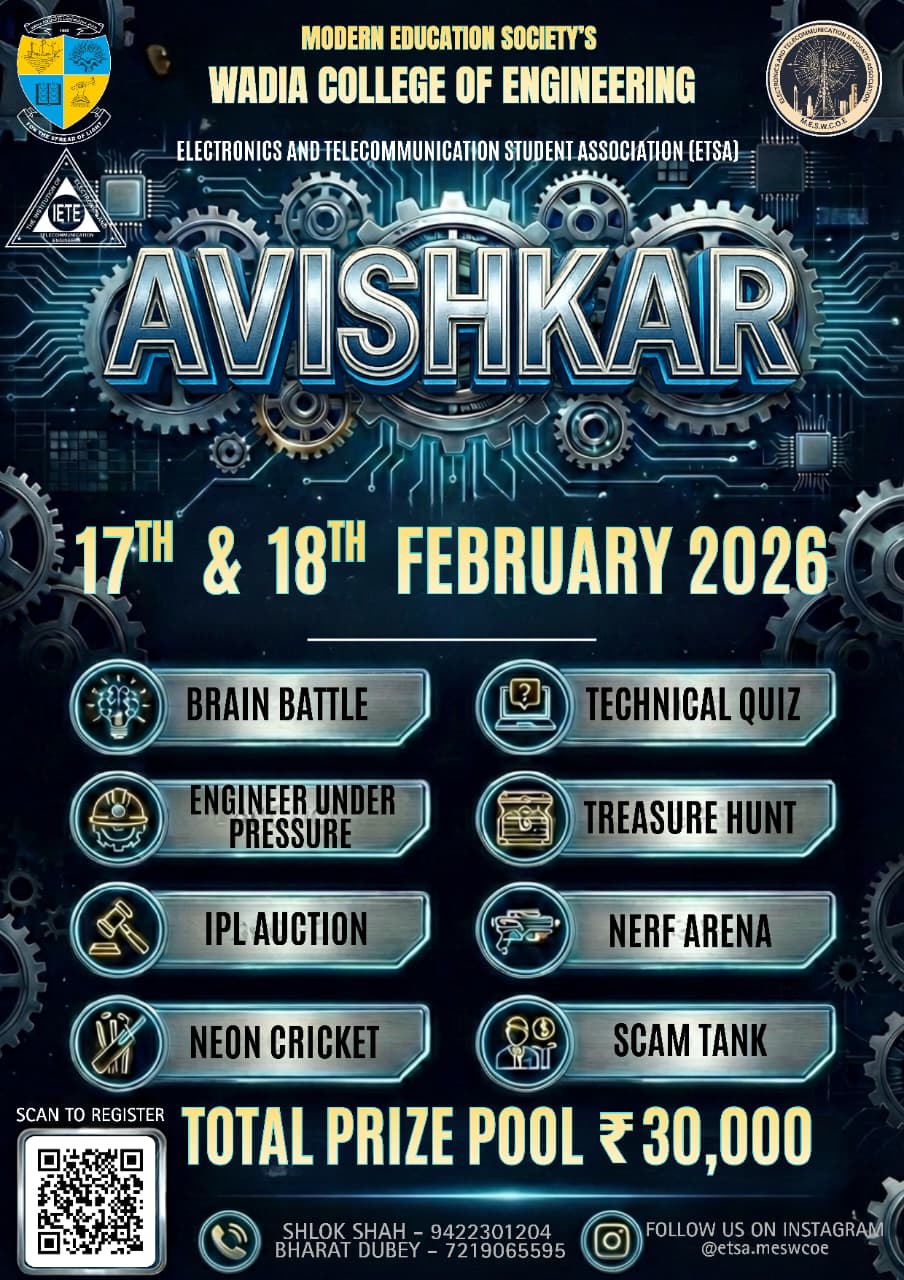
Innovation. Creativity. Competition. Energy. Everything comes alive at AVISHKAR – ETSA 2026!"
17th & 18th February 2026 "
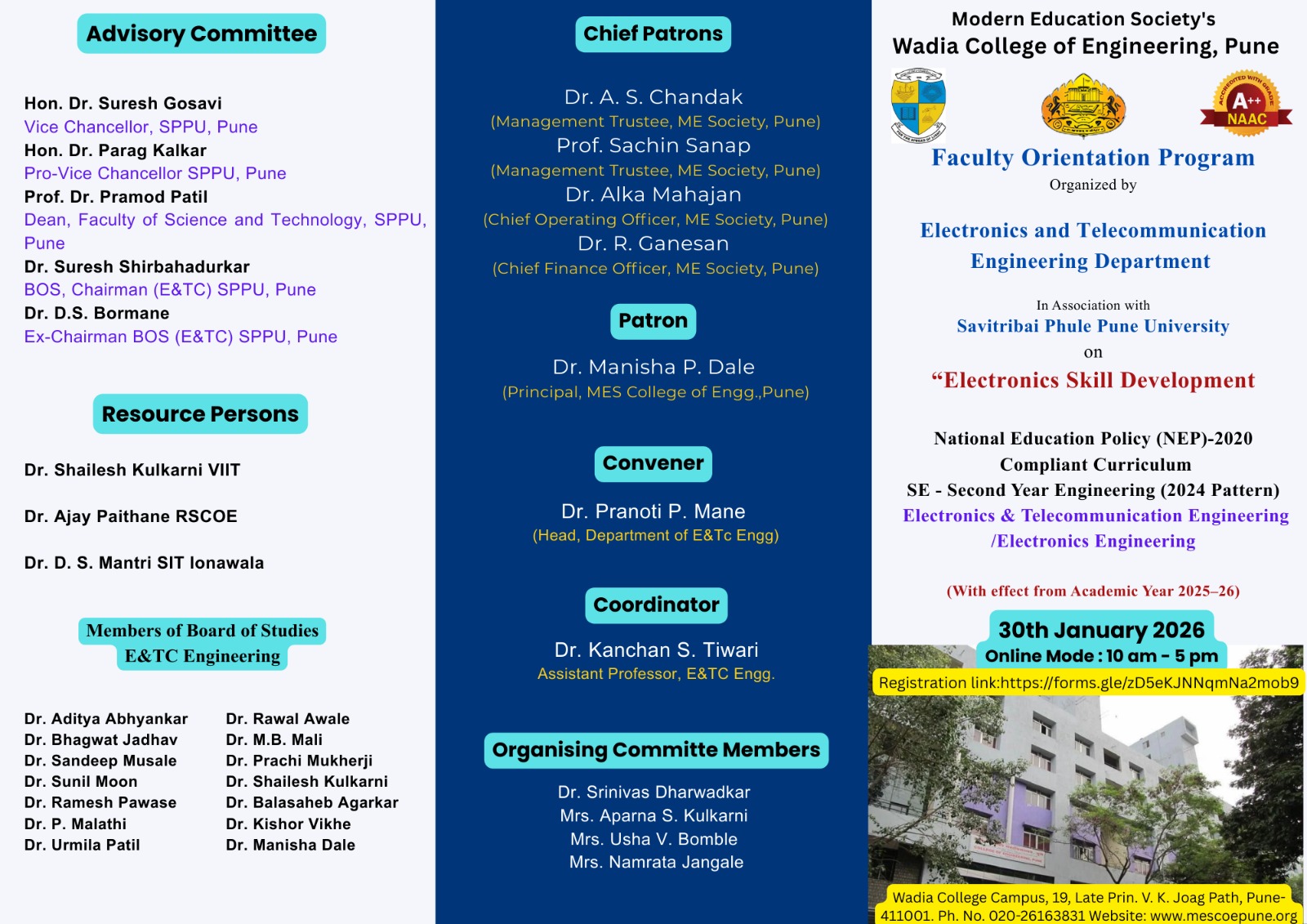
Electronics Skill Development - Faculty Orientation Program"
30-Jan-2026"

10th National Conference on “Advancements in Communication, Computing and Electronics Technology” & 2nd International Symposium on “The Impact of AI on Education and Engineering Jobs” In Association with “ICT Academy " and “ IETE Pune” on 04th April 2025 Organized by Department of Electronics & Telecommunication engineering, Modern Education Society’s Wadia College of Engineering, Pune."
About the Conference and Symposium Welcome to the National Conference & Symposium on “The Impact of AI on Learning and Industry Jobs! • This event gathers thought leaders, educators, industry professionals, and policymakers to explore how artificial intelligence is reshaping our approaches to education and transforming job markets worldwide. • As AI continues to evolve, it presents both challenges and opportunities. This symposium will delve into the implications of AI, fostering discussions that can lead to innovative solutions and practices in learning and employment. 
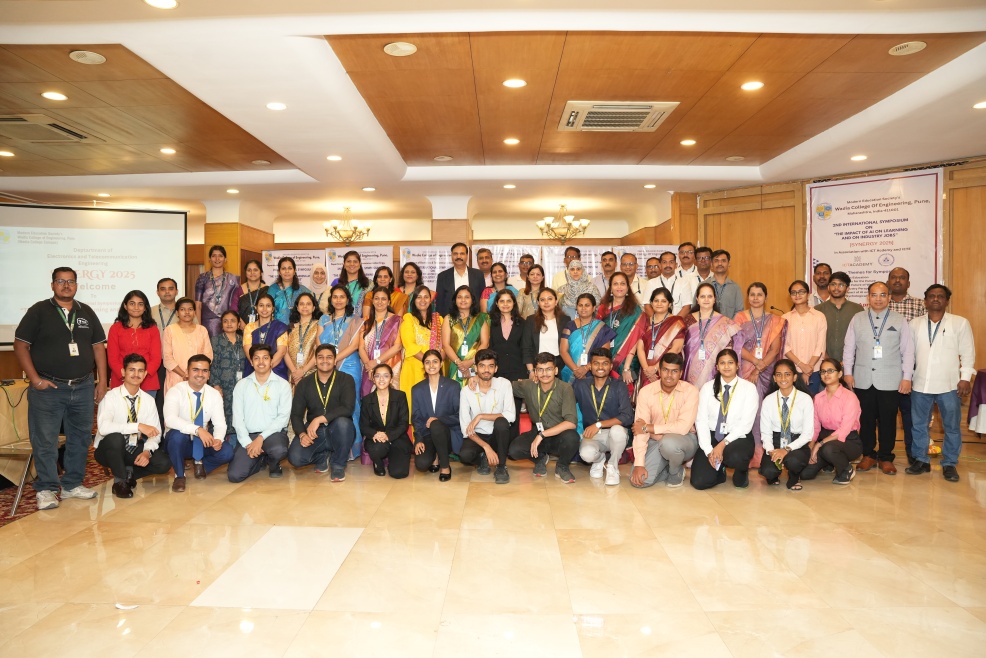 "
"

The "Hands-on Workshop on Signal and Control System Concepts using MATLAB" was successfully conducted on March 17-18, 2025 for SE E&Tc students."
The workshop aimed to provide participants with practical exposure to MATLAB and its applications in signal processing and control system design. The event was designed for SE students, researchers, and professionals seeking to enhance their knowledge and skills in these domains.  "
"

Speaker: Dr. Vrushali Raut, Associate Prof. Sinhgad College of Engineering, Pune. "
Objectives of the Guest Lecture: • To introduce students to advanced concepts and techniques in modern control systems. • To build an understanding of real-world control system design beyond classical theory. • To illustrate the application of control principles in various engineering domains. • To prepare students for future academic projects, internships, and research opportunities . • To motivate students to explore emerging technologies in automation and control. 
 "
"
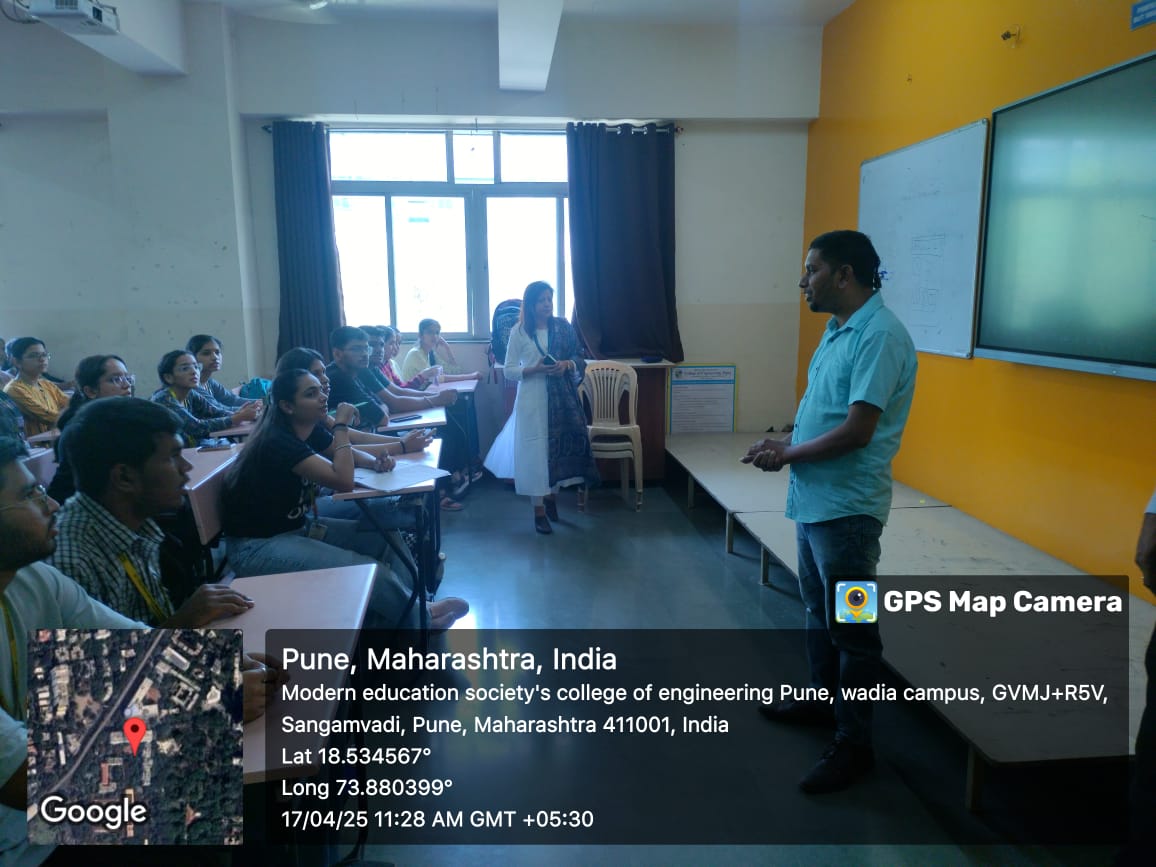
An interactive guest lecture was organized for the Second Year (SE) and Third Year (TE) students of the Electronics & Telecommunication Engineering (E&TC) department. The session was graced by Mr. Omkar Kelkar, a distinguished speaker from Kelkar Gayatri CNC Pvt. Ltd. The event aimed to bridge the gap between academic learning and industry expectations while encouraging innovation and entrepreneurship among students."
Key Highlights of the Session: • Project Selection Guidance Government Project Funding Upcoming Project Opportunities Innovation and Entrepreneurship Internship Opportunities  "
"

We are thrilled to share that our project secured Second Prize in the Industrial Automation category at the prestigious state-level competition DIPEX-25. The Prize Distribution Ceremony at DIPEX 2025 stood as a distinguished occasion, marked by the celebration of innovation and excellence. The event was honored by the presence of notable dignitaries, including Prof. T.G. Sitharam, Chairman of AICTE, Dr. Suresh Gosavi, Vice-Chancellor of SPPU, Shri Ram Bhogale, Chairman of Srijan, Dr. Virendra Singh Solanki, National General Secretary of ABVP, Sankalp Phaldesai, Convenor of DIPEX 2025, Sameer Wagh, State TSVK Convenor, Dr. Pragati Thakur, Pune City President of ABVP, and Prof. Amit Nehte, State Joint Secretary Shravni. The award was presented by Hon. Prof. Dr. Sitaraman, Chairman of AICTE, Delhi, in the esteemed presence of other dignitaries."
It’s truly a moment of pride and honor for me as a Project Guide to witness this achievement. Kudos to my students of Final year E&TC Engineering : Atharva Mhasal , Sanjili Kanhere Sakshi Argade 🎊💐🎉 Super proud of all of you… A special thanks to our Principal Dr Manisha P. Dale and HoD Dr. Pranoti Mane for believing in us and providing sponsorship to the project. Heartfelt thanks to management of Wadia College of Engineering ."
'ABHIRATHA 2K25’ promises to be a spectacular celebration, focusing on fostering technical and non-technical development among students through engaging activities and events. It is with great excitement that we extend this invitation to you to join us for this momentous occasion."
This celebration marks a significant milestone for ETSA as we embrace the spirit of the occasion and bring our community together once again. We sincerely hope you can join us in inaugurating this intercollege event. Your presence will be highly appreciated which will contribute to the success of 'ABHIRATHA 2K25’ and we look forward to it."

The E&TC department of MES Wadia College Of Engineering, Pune is organizing a National Level Event “ETSA 2K25” on 05/02/2025 and 06/02/2025 "
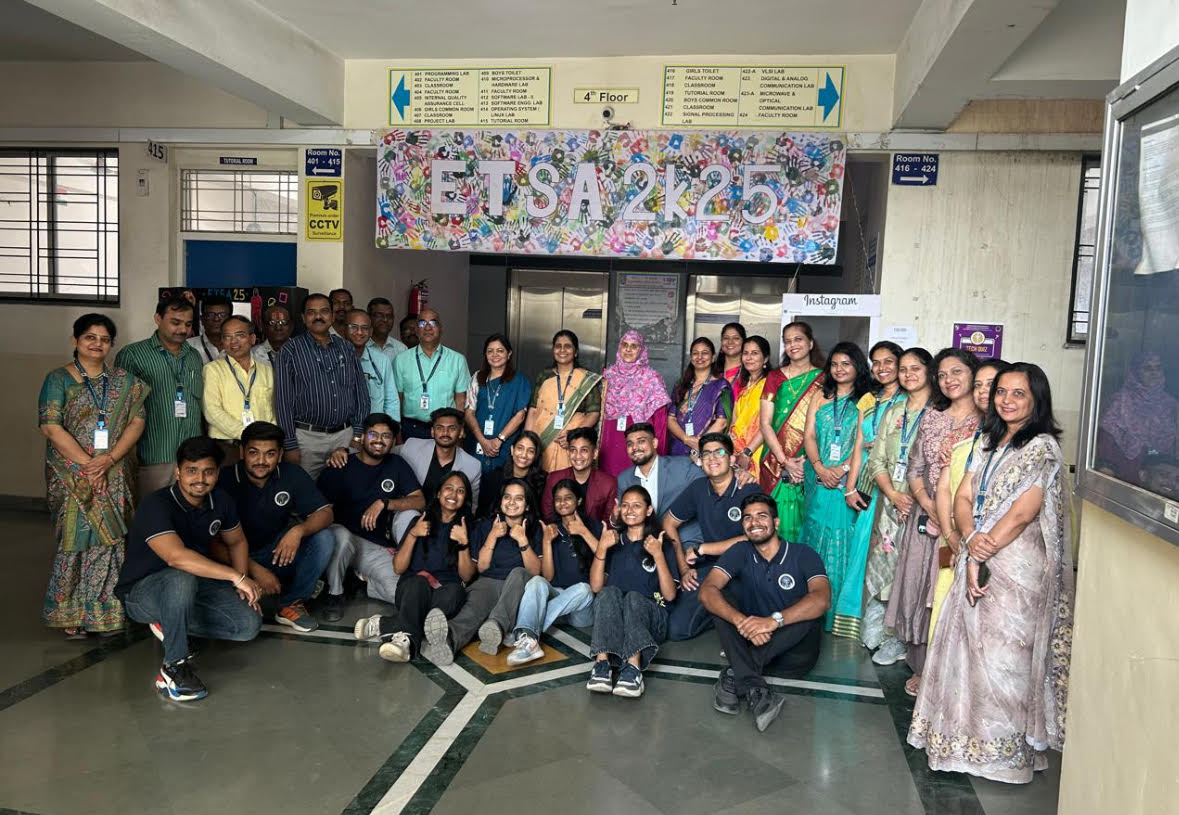
 "
"
On November 25, 2024, the Mechanical Department organized an industrial visit to the Mercedes-Benz Assembly Plant at Chakan, Pune, for students of the Mechanical and E&TC departments. This visit, facilitated by our esteemed alumnus Mr. Nikhil Sangle, provided a unique opportunity for students to witness the advanced manufacturing processes of a globally renowned automotive leader.
Coordinated by Dr. A. R. Patil (Mechanical Dept.) and Dr. P. M. Baglul (E&TC Dept.), the visit included a comprehensive tour led by Mr. Yadunath Kulkarni from the Technical Team. Students explored the precision and innovation of the assembly line and were introduced to Mercedes-Benz’s rich history and vision for the future through an engaging audio-visual presentation. A notable highlight was learning about Ms. Bertha Benz, the first woman driver in automotive history, whose legacy continues to inspire the automotive industry. Special thanks to Ms. Sarika Salunke for securing permissions and extending warm hospitality, making the visit memorable. This experience provided invaluable insights into advanced assembly processes and technologies, leaving students inspired and eager for more such educational opportunities.
The Technical Session on Additive Manufacturing (Green Technology Approach), held on October 21, 2024, at Modern Education Society's Wadia College of Engineering, in collaboration with MESWCOE Green Club had successfully engaged undergraduate mechanical engineering students with insights from industry leaders at Dassault Systèmes. The event featured informative presentations by Mr. Ashish G Kulkarni, Mr. Shubham Arora, and Mr. Harshvardhan Rajebhosale, who highlighted the transformative role of additive manufacturing in promoting sustainability and eco-friendly practices.
A significant discussion took place between the Dassault team and faculty members regarding the essential skill sets needed for students aspiring to enter this dynamic field. Our guests were felicitated with a shawl and a plant by Dr. P.M. Bagul and Prof. Y. M. Ajgar, followed by the presentation of mementos by Dr. V. N. Chougule as tokens of appreciation. The event was coordinated by faculty members Dr. A. R. Patil and Prof. Sushant S. Jadhav with the assistance of student volunteers Mr. Harshad and Mr. Mayur. The session was anchored by Ms. Ishita and Mr. Vivek, who ensured the smooth flow of the program.
The Department of Mechanical Engineering at Modern Education Society's Wadia College of Engineering, Pune, in collaboration with the Green Club and MathWorks India, successfully conducted a two-day National Level hands-on Short-Term Training Programme (STTP) on "Modelling and Simulation of Powertrain, Battery, and Control Systems using MATLAB" on 18 and 19, October 2024. Participants from various parts of India, including Bihar, Karnataka, and Jharkhand, attended the program, contributing to its broad national reach. The inaugural ceremony on 18 October 2024 featured Mr. Nandkumar Wandre, Director of Operations, Haosen Technology Company Pvt. Ltd., Pune, as the Chief Guest, Dr. P. A. Patil, Chairman, Board of Studies (Automobile and Mechanical), Savitribai Phule Pune University, Pune as Guest of Honour and Mr. Vinayak Padmaji, Application Engineering Group, MathWorks India, Pune, as the keynote speaker. They highlighted the growing importance of simulation tools in the electric vehicle industry.
The STTP provided insightful technical sessions, including a standout presentation by Dr. Bansilal Bairwa from the School of Electrical and Electronics Engineering, REVA University, Bengaluru, which focused on MATLAB-based simulation techniques for powertrain and battery systems, giving participants valuable hands-on experience. The valedictory session on 19 October 2024 was honored by Dr. Anirban Sur, Professor and Head of the Mechanical Engineering Department at SIT, Symbiosis International University, who delivered an informative address on the future role of simulation technologies in the electric vehicle sector. This successful event was coordinated by Dr. Amit R. Patil, the organizing chair, and the coordinators Mr. Sushant S. Jadhav and Mr. P. V. Bute, with significant contributions from the entire organizing committee under the mentorship of management committee of Modern Education Society. The event was held under the guidance of Dr. V. N. Chougule, Head of the Mechanical Engineering Department, and Dr. M. P. Dale, Principal of MES Wadia College of Engineering.
Guest lecture of Dr. R. S. Jha is organised for mechanical student to create awareness of thermal processes in boiler industries and latest development from green and sustainable approach. This session focussed on traditional thermal process and it’s challenged and then cover the latest advancement like use of bio mass and hydrogen, electric modelling, Data driven modelling and simulation in thermal process etc. This session closes with Q & A Session followed by Feedback. The speaker was appreciated with Memento by Dr. V. N. Raibhole, Dean Academics as gesture of gratitude on behalf of department.
The program was anchored by Ms Abhasse and Ms Vaishanv from TE Mechanical. Ater this session. A small meeting with senior faculty member, TPO Team and Guest has been organised to discuss about skill requirement of industries, possible ways and internship/place opportunities in Thermax ltd,
Guest lecture on Product Development on Entrepreneurship under project management on 6th may 2023 was conducted in online mode.
The expert Mr Abhishek Bang ,Vice president of Citi ,Pune was speaker .
He discussed following topics Development process and organisationa,project planning, Intellectual property right patents, Characteristics of successful entrepreneurs
IETE Inter Collegiate Project Competition-2023” organized by IETE in association with E & TC department, MESCOE, Pune on24th April 2023
One-day LaTeX workshop" organized by E&TC department, MESCOE, Pune for B.E. students and Staff members on 21st April 2023
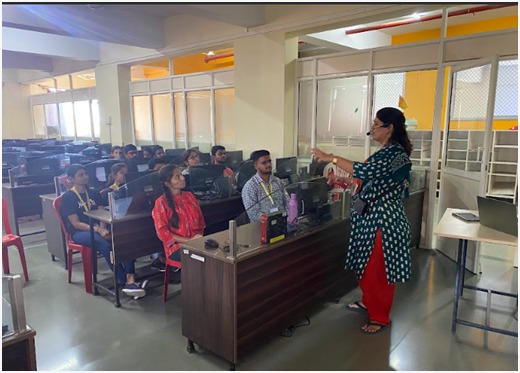
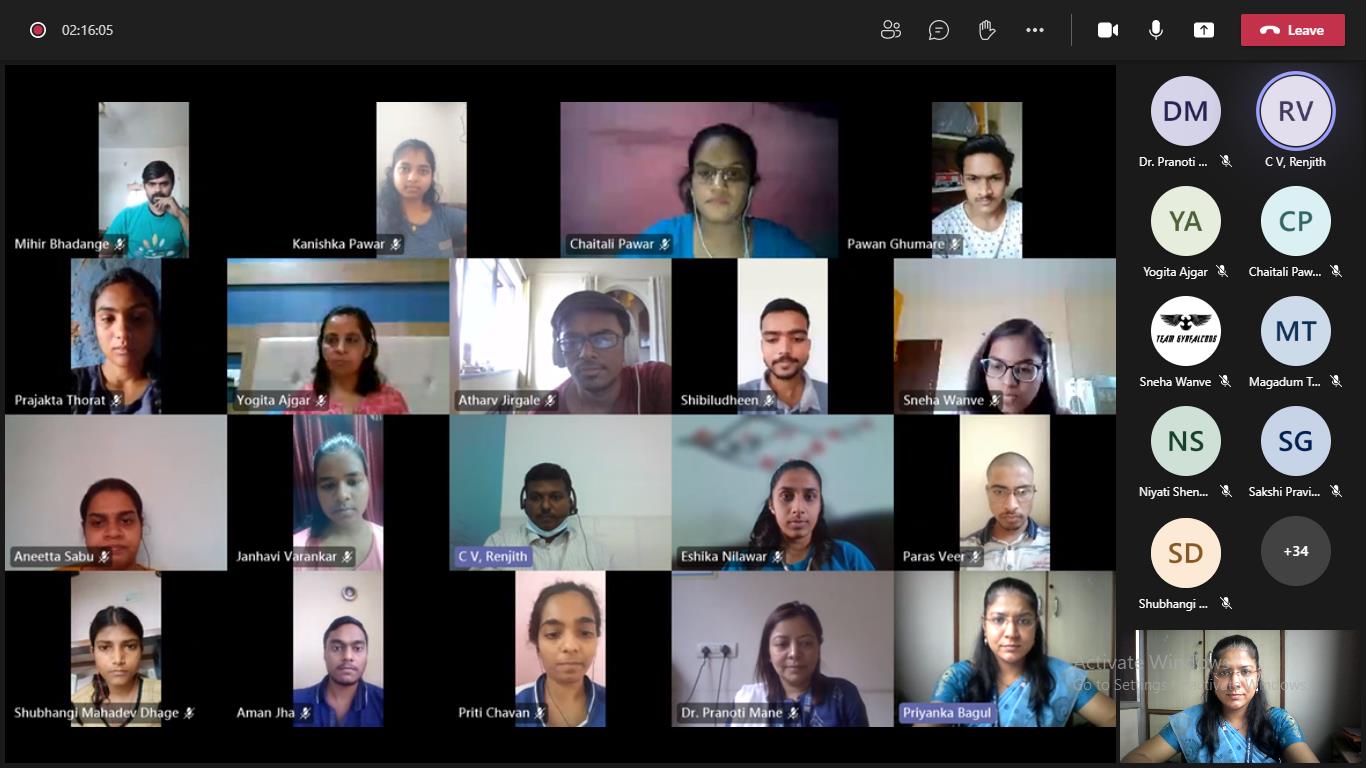
Objective: 1) To gain Knowledge regarding the Future enhancement of the Electronics Branch.
2) Higher Studies in Electronics sub-branches.
3) To gain knowledge about the Electronics Industry.
Mr. Renjith CV:- He is the Electrical Architect-Medical Imaging at Philips Healthcare. He has 19+ years of Experience in Electronics and in Product design. Along with this Mr Renjith has expertise in X-Ray Imaging design for Cathlab, C-Arm, and Diagnostic X-rays Systems. He has a wide range of experiences as he has worked with different people from different countries such as the Netherlands, France, Germany, China, South Korea and India. He shared his fruitful knowledge of Products regarding Electronics and gave the students wonderful guidance on Future Enhancement of Electronics.
Targeted Audience:- SE, TE and BE students.
Number of Staff Members:- 8
Number of Students Presents:- 97
Date:-20th July 2021.
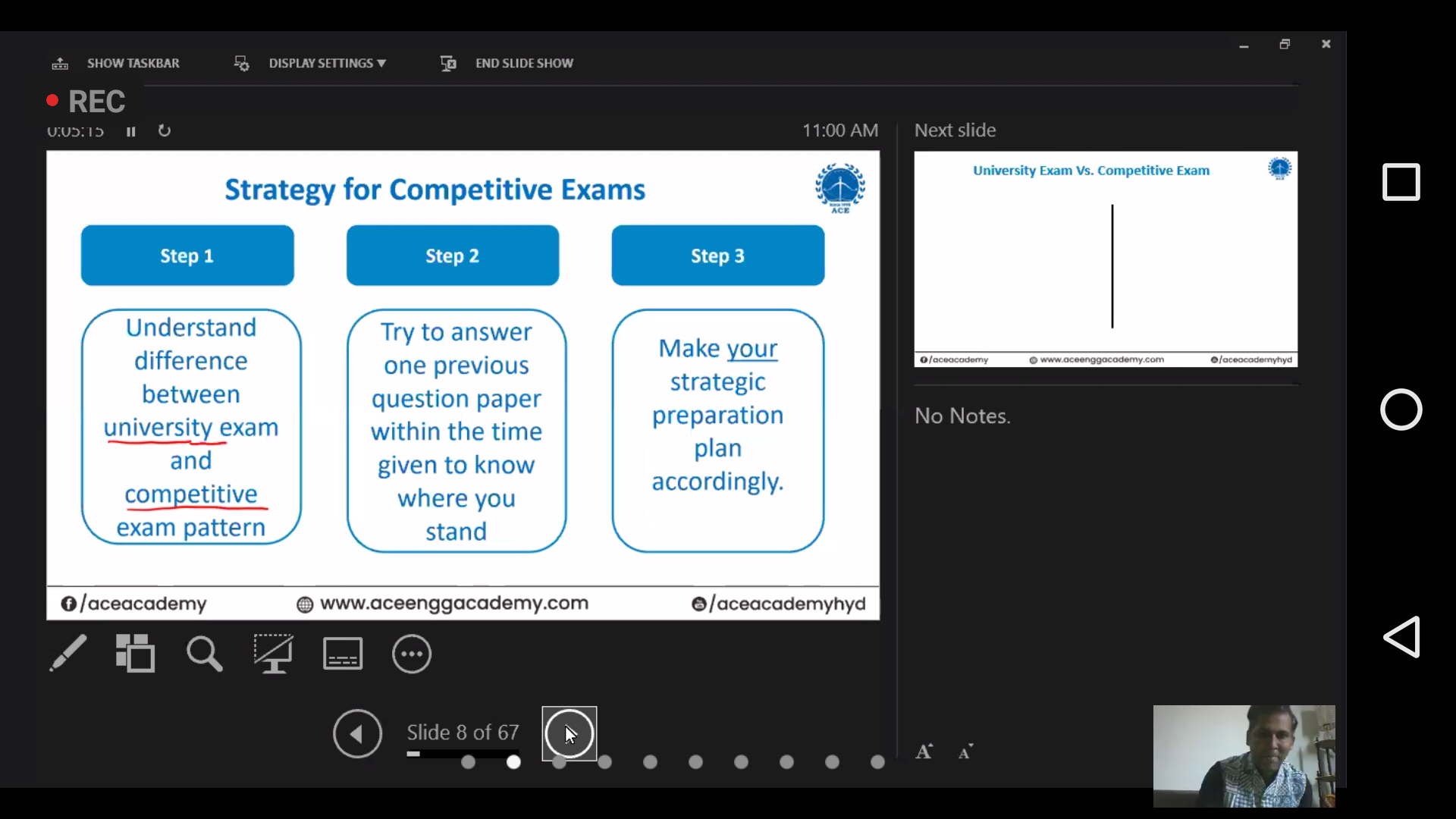
Objectives:
1. To create awareness amongst students about the GATE exam.
2. To create awareness about the importance of basic subjects of E&TC in the GATE exam.
3. To motivate students for giving gate exams.
An online guest lecture on “Career Opportunities after Graduation Through Gate Examination” by ACE Academy was conducted for SE and TE students on 4 February 2021 at 10.30 am on ZOOM platform. The lecture started off with sharing Guest Speaker Mr. ANAND KUMAR sir’s personal experiences. The speaker then explained to the students regarding different streams for the GATE exam and cutoff marks for different streams, marking scheme, and Paper pattern. He also explained the method for preparation and the subjects which are important and how many marks those subjects carry in the GATE exam. Different openings in the government sector after qualifying GATE exam.
Students were then given details (Exam procedure, Job offered, Pay, Syllabus, How to prepare, Application) about GATE Exam.
Target Audience: SE, TE students.
No. of Students Present: 132.
Day &Date: 4th Feb 2021.
Resources Person: Mr. Anand Kumar ACE Academy.
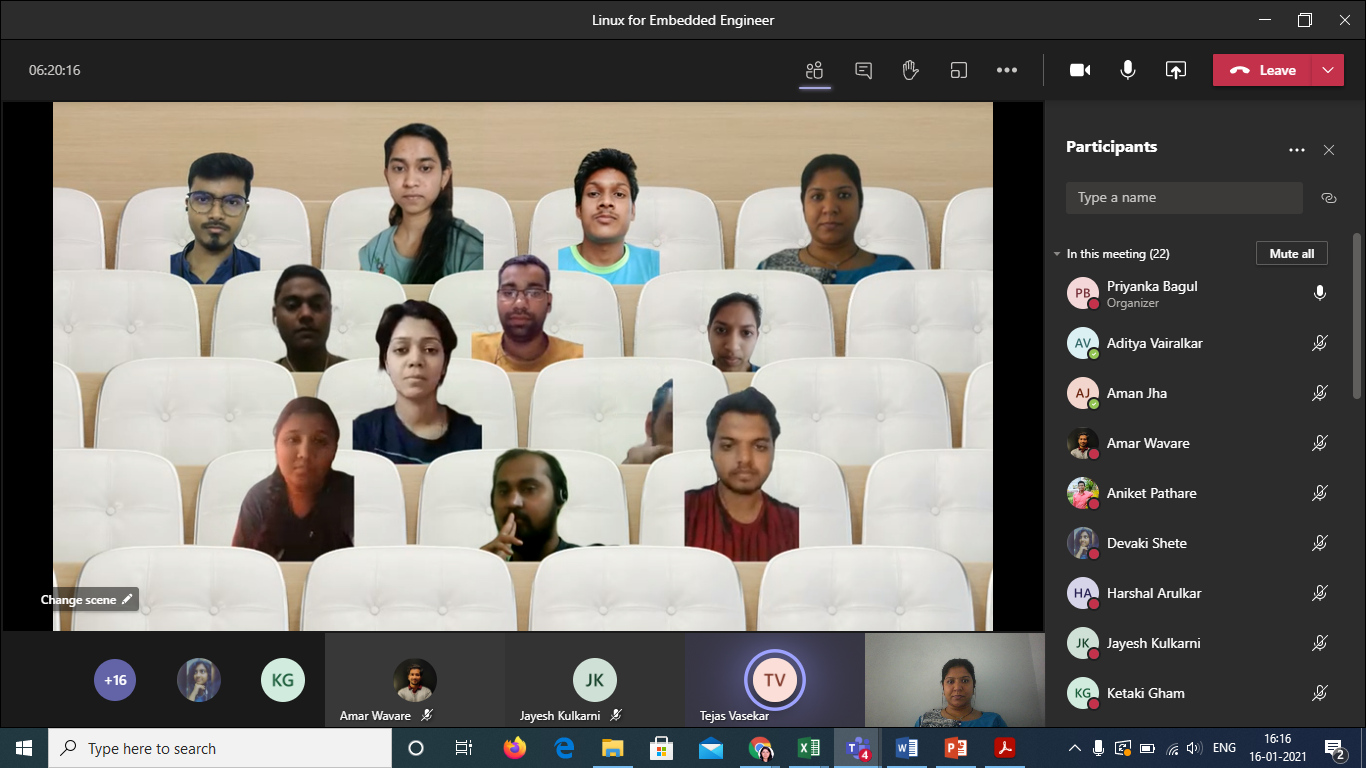
Objectives:
1. To gain a strong foundation in Linux from scratch.
2. To help students master important Linux concepts such as Linux installations, Packages, Architecture, File System.
3. To enhance Alumni interaction with current students.
Name of the Guest Speaker: Mr.Tejas Vasekar (Alumni of E&TC, MESCOE) Mr.Tejas Vasekar has received a B.E degree in Electronics & Telecommunication Engineering from MES College of Engineering, the University of Pune in 2017. Currently, he is. Working as a Firmware Engineer at AMS semiconductor Hyderabad. He has 2.5 years of experience in Firmware Engineering, worked on multiple HW platform
Guest Speaker shared his personal experiences, the difficulties faced by him, the efforts taken and more about his career path.
Target Audience: SE, TE and BE students
No. of Students Present: 77
Day &Date: Saturday, 16 January 2021
Time frame: 11 AM to 5 PM.
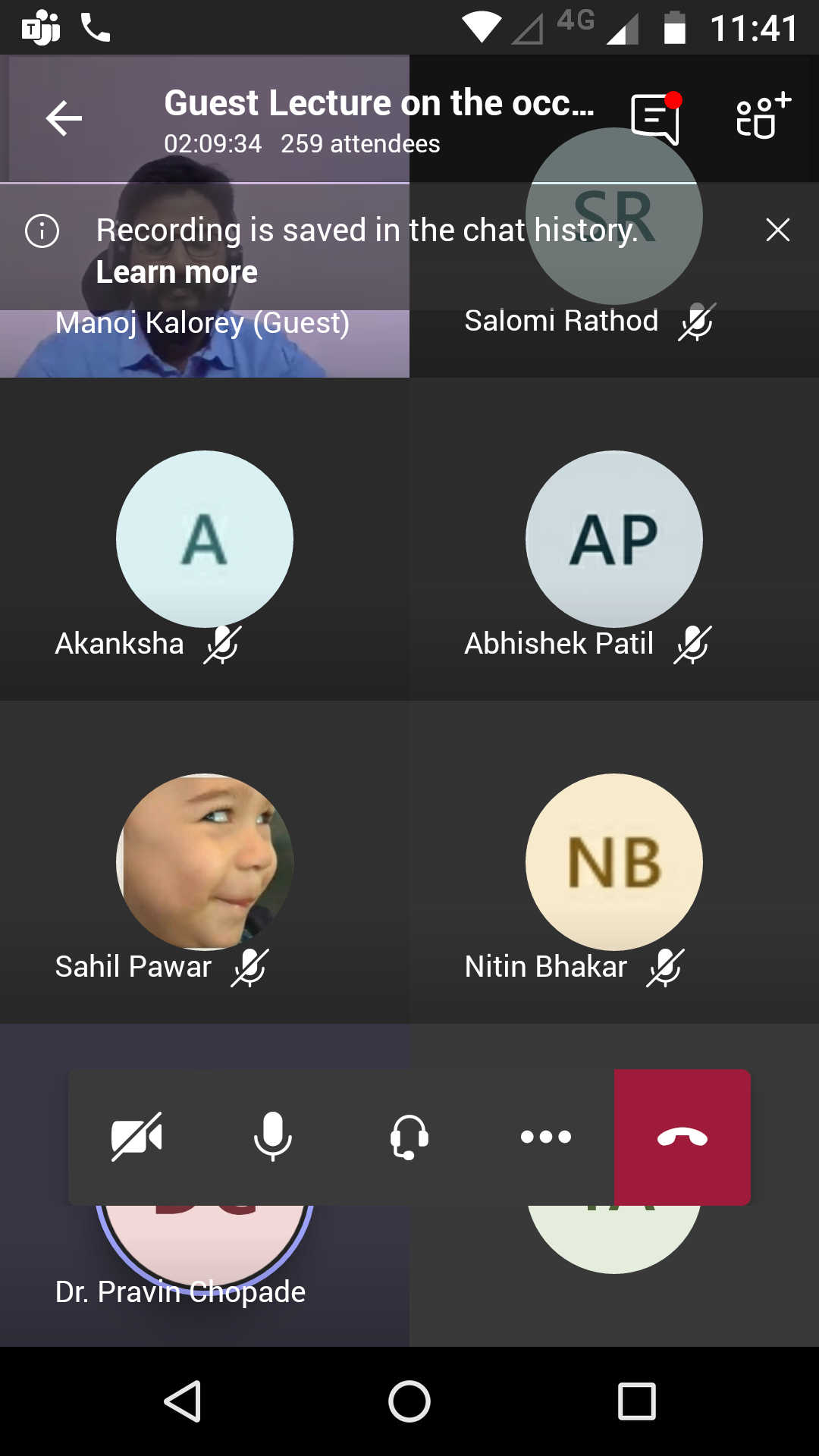
Objectives:
1. To make the students aware of current trends in Industry.
2. To motivate the students for higher education
3. To enhance alumni interaction
A lecture was conducted for all E&TC students. The lecture started off with sharing Guest Speaker’s personal experiences, the difficulties faced by him, the efforts taken, his career path etc. Mr. Manoj Kalorey worked as a development specialist in Big companies like Mercedes Benz, Capgemini, General Electric, Diageo etc. He is also the winner of the Hackathon held at Daimler Germany in 2019.
Mr.Manoj very nicely explained the carrier options after graduation i.e. Core, IT, Networking, MBA, PG, GATE etc. He also told the students about the add-on courses in which students can opt for a better career. He focused on the importance of Aptitude and communication skills also. The Guest Speaker also explained the current trends of the IT industry i.e. Data scientists, Big data Engineer, and Data Engineer and their roles and responsibilities. Also, students were told about factors to consider for choosing the right career, how to be motivated to study and Students also asked about their doubts.
The lecture ended with the prime focus being "Choose a career that makes you Happy"
Target Audience: SE ,TE ,BE E&TC students
No. of Students and Staff Present: 259
Day &Date: 5th September 2020.
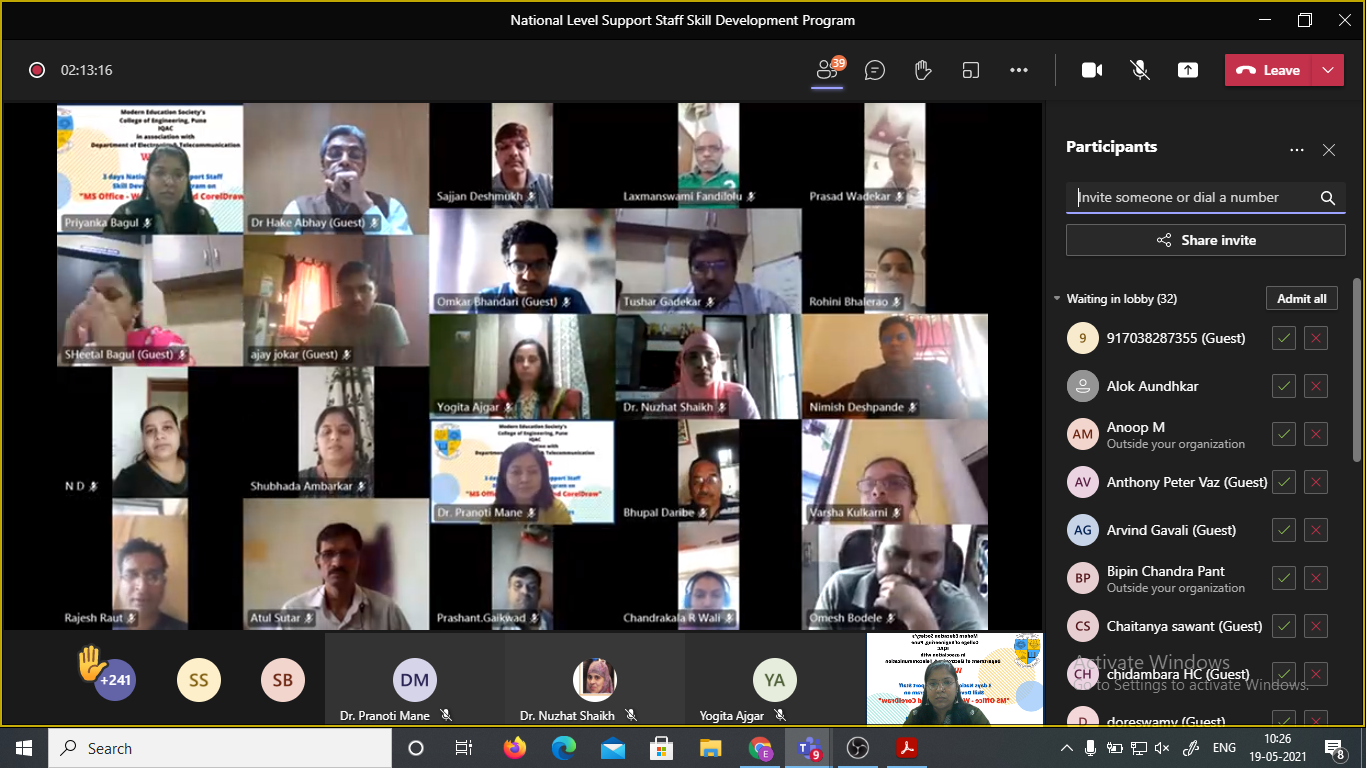
Objectives:
● To skill up Microsoft Office knowledge which will help support staff to execute their departmental responsibilities.
● To impart knowledge of Corel Draw to support staff.
Target Audience: All supporting, administrative, and library staff who are working in Higher Education Institutions.
Resource Person: Mrs. Sheetal Bagul (MS Office Certified Trainer) She is running her own computer institute known as “Bagul Infotech”, conducting various courses Fundamental of Computer, M.S. Office, Tally 9.0 ERP, Internet, Programming Language C programming, C++, Data Structure, Visual Basic 6.0, Core java and Advance JAVA, DBMS, etc. She has work experience of more than 6 years as Faculty in ICWAI (Pune Chapter of Institute of Cost & Works Accountants of India). She has received International Certification of Microsoft Office Specialist & Microsoft Office Expert (MS Word & MS Excel).
We have received more than 1000 registrations from all over India, almost from all states like Tamilnadu, Madhya Pradesh, Chhattisgarh, Punjab, and Haryana. On Ms Teams every day more than 320 participants attended the program and the event was live-streamed on the YouTube channel. The session was very interactive. For every topic, hands-on sessions, assignments and tests were conducted. The participants shared their experiences and appreciated the workshop during the valedictory function. Online e-Certificates were issued to all the participants after the successful submission of their feedback.
Outcomes:
● Staff can support departmental activities like maintaining student data, preparing mark sheets for exams etc.
● Staff will be able to prepare brochures for various activities. Date/Duration of the program: Wednesday, Thursday, Friday 19th, 20th, 21st May 2021 (Three days) Time frame: 10:00 a.m. – 5:00 PM for all 3 days. No. of Staff Present: 400+

Objectives: 1. To educate interested students about the use of the software Proteus in PCB design and simulation. 2. To create schematics and electronic prints for manufacturing printed circuit boards. 3. To enhance Alumni interaction with current students.
Name of the Guest Speaker: Mr.Rohit Tondare (Alumni of E&TC, MESCOE) : Mr.Rohit Tondare has received the B.E degree in Electronics & Telecommunication Engineering from MES College of Engineering, University of Pune in 2020.
The Proteus Design Suite is a proprietary software tool suite used primarily for electronic design automation. The software is used mainly by electronic design engineer and technicians to create schematics and electronic prints for manufacturing PCB. It is easy to use and widely used in industry. PCB designing is the most required part of Electronics hardware and product development. In this workshop, students built basic circuits using opamp. The circuits using Arduino boards were also simulated. The students learnt how to design single and multi-layered PCB. Guest Speaker shared his personal experiences the difficulties faced by him, the efforts taken etc.
Target Audience: SE TE and BE students No. of Students Present: 98 Day &Date: Saturday and Sunday 23 January and 24th January 2021.
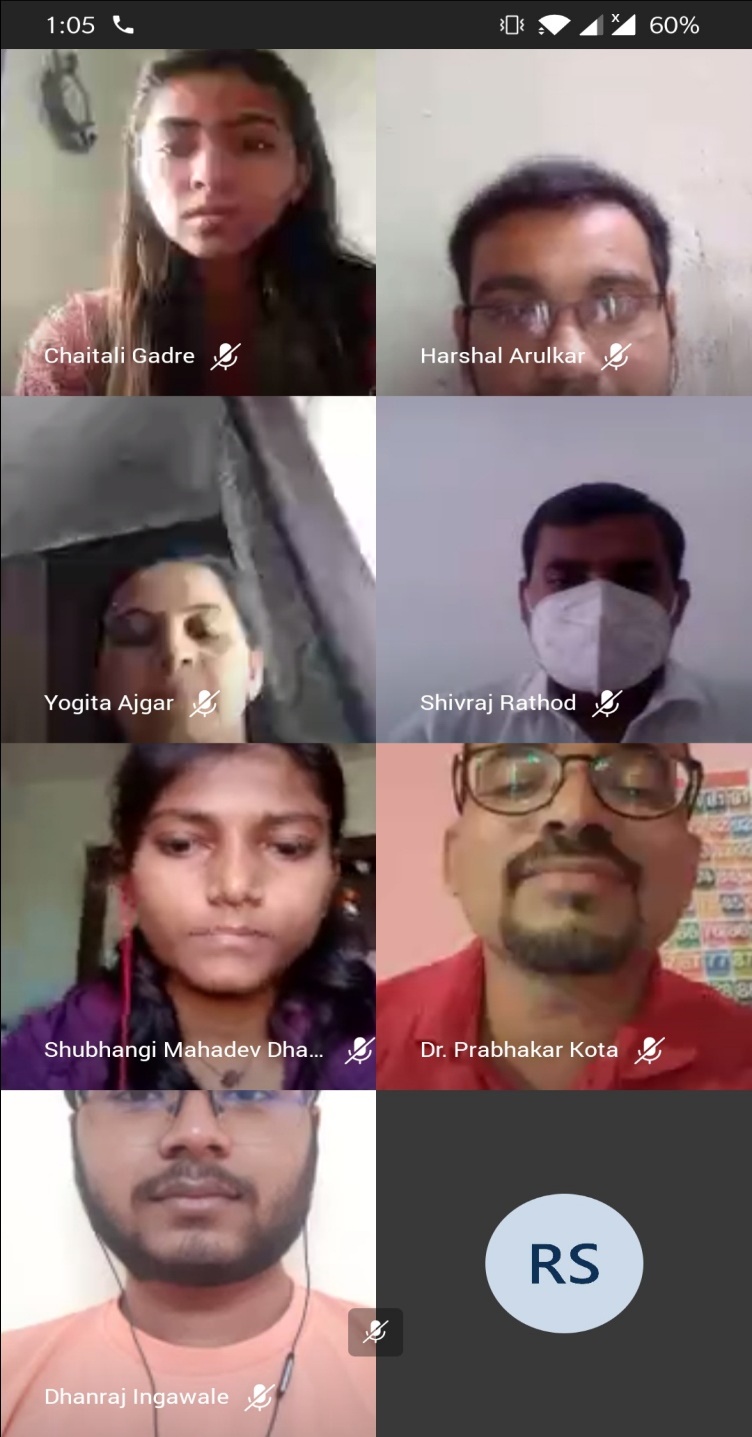
Objectives: 1. To create the awareness about RF/Microwave domain in Defence R&D Sector 2. To motivate the students to select core electronics as their career. 3.To enhance Alumni interaction with current students .
Name of the Guest Speaker: Dr.Shivraj Rathod (Alumni of E&TC, MESCOE) Dr S. M. Rathod has received the B.E degree in Electronics & Telecommunication Engineering from MES College of Engineering, University of Pune in 2012. He received both M. Tech and PhD degree in Electronics Engineering from Veermata Jijabai Technological Institute (VJTI), in 2015 and 2019, respectively. Currently, he is an Assistant Manager in Defence R & D Division of Kalyani Centre for Technology and Innovation (KCTI), Bharat Forge Limited (BFL)-Pune. Now, he hold the position of coordinator for “Centre of Excellence in RF & Microwave Technology” at Defence R&D Division of BFL, Pune. He is coordinating the team members at KCTI group for the Indigenous development of various Radar systems for Ministry of Defence under Indian Design, Development and Manufacturing (IDDM) category with Make in India Scheme for Defence production. He started his presentation by giving introduction of Bharat Forge and its different campuses and their different products .He nicely explained the importance of basic subjects like DSP,DIP,and Electromagnetics,Electronics Design and many more and their applications in Defence industry.He explained the different job opportunities in RF and Microwave area. Guest Speaker shared his personal experiences,the difficulties faced by him,the efforts taken etc.Dr.Shivraj’s Journey was really motivational . He also explained about the internship opportunity in BFL,scholarship students can get in BFL.
Target Audience : TE and BE students No.of Staff Present : 08 No. of Students Present: 70 Day &Date: , 5th December 2020. Time frame: 11 AM to 1 PM
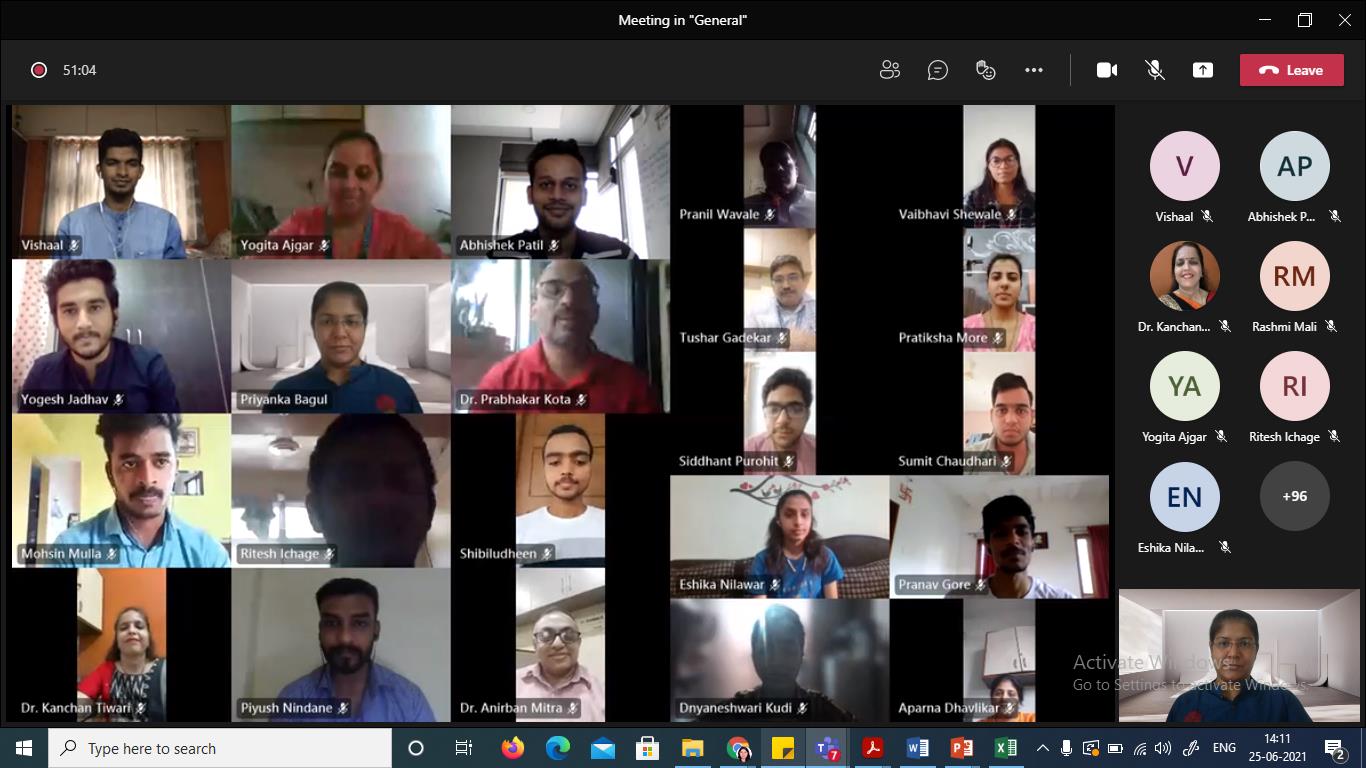
Objective: -
1) To gain knowledge regarding higher studies abroad
2) To know about placement preparation and project selection.
3) To learn about GATE preparation.
Name of Guest \Speaker: -
1)Vishal Pillai: - He passed out last year with distinction in BE from MES College of Engineering, Pune. He has been admitted to the Master’s degree program in Electrical Engineering at LUT Finland. He has also scored 7.5 in the International English Language Test System Exam. He guided students regarding higher studies abroad and the documents required and the exams required for preparation for higher studies abroad.
2)Piyush Nindane (Embedded &IOT Engineer) and Abhishek Patil (BE E&TC): - They are from batch 2021 of BE. They guided regarding placement preparation and project selection. Even they shared their thoughts and valuable knowledge through their real-life experience. They introduced students to the important aspects and skills required to crack interviews. They provided the tricks to tackle the placement challenges.
3)Yogesh Jadhav(E&TC) and Pranav Gore (MECH): -They are from the current batch of BE. They guided students regarding GATE preparations. They helped students with the books and handwork required to crack the exam.
Targeted Audience: - SE and TE students
No of staff members: -8
No of students present: -96
Date: - 25 June 2021
Time frame: - 1:30 pm to 4:30 pm
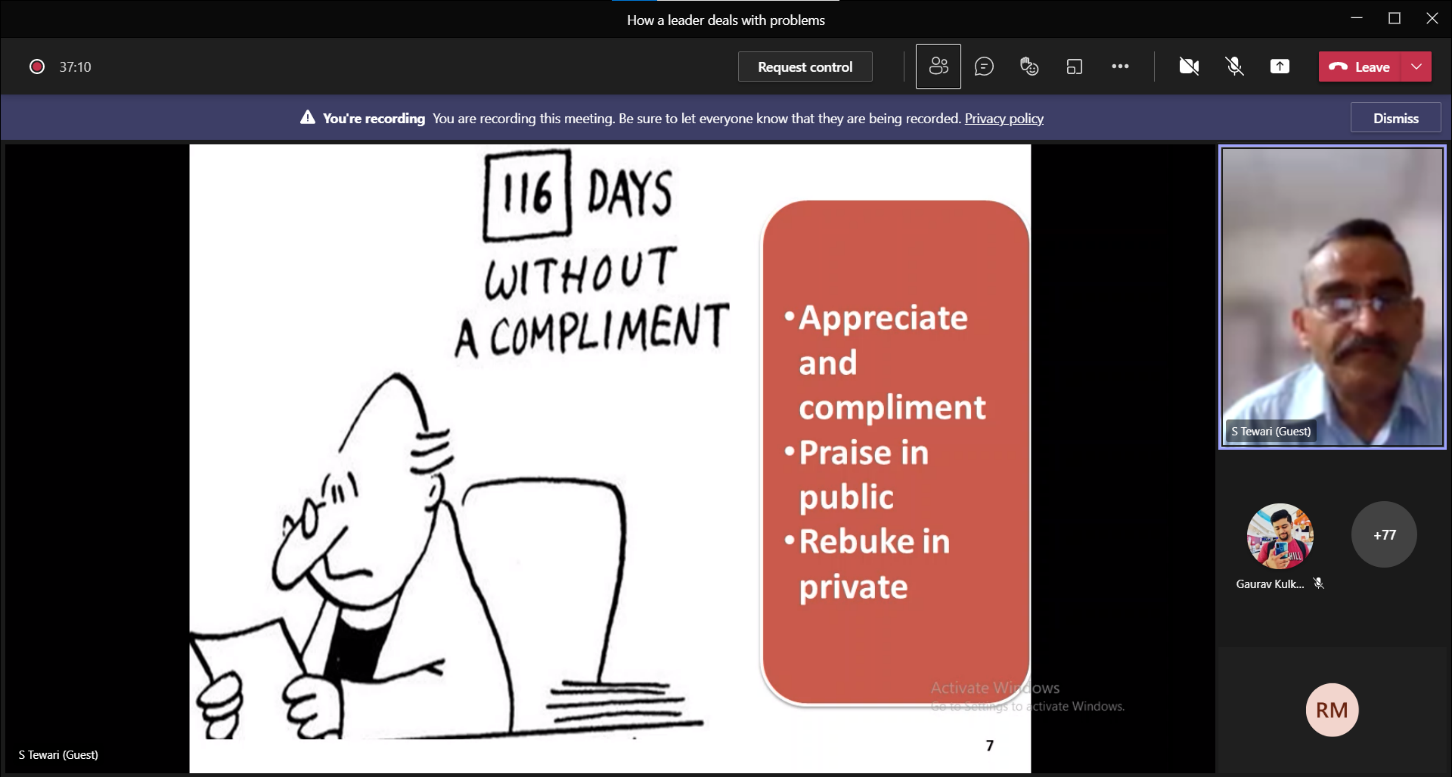
Rashmi Mali, President of the Directing Visions club invited Brigadier Saurabh Tewari Sir for the informative session on 29th June, 2021. The program started with an introductory speech by Rashmi Mali about the Guest. The session was then handed over to the Guest for further continuation. Sir initially began by introducing himself to the students and then talked about general things related to the army. He explained his thoughts regarding leadership and the qualities that should be acquired by a leader with the help of a presentation and his experience in the Indian Army. He shared the perks of getting into the defense forces and personal experiences of himself during his service time, and how to tackle complex problems. He shared the joining procedure that students can opt for. By knowing his personal experience students were amazed about him. He also talked about his experiences while working with different kinds of Ministries in India. He explained about different types of situations that arise in life unknowingly and how to tackle such problems positively with confidence and patience. He described the qualities that a student should acquire during their early ages so that it will help them in the future. He then shared some tips for the SSB interview. Excitingly, he also shared a booklet of notes from the book “How to win friends and influence people” by Dale Carnegie and recommended that students read it. Lastly, a Questions and Answers session was conducted in which participants’ doubts and queries were solved. His contribution to the nation was appreciated, valued, and acknowledged. At last, the session was concluded with a vote of thanks by Rashmi and the overwhelming response by the members was appreciated.
The session lasted for about an hour. Participants enthusiastically took part during the session. All the doubts of attendees were cleared by Saurabh Sir. Excellent responses were given by the participants.
Date: 29th June 2021 Time: 4-5 pm
Total Participants: 153 people Platform: Microsoft Teams